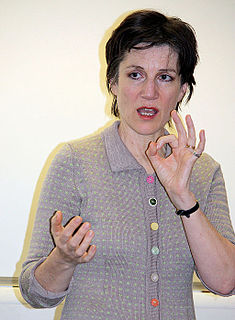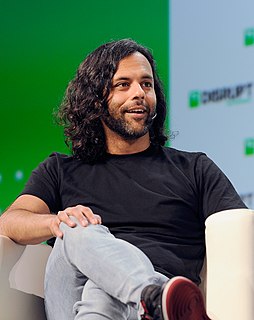A Quote by Alan Watts
We accepted a definition of ourselves which confined the self to the source and to the limitations of conscious attention. This definition is miserably insufficient, for in fact we know how to grow brains and eyes, ears and fingers, hearts and bones, in just the same way that we know how to walk and breathe, talk and think - only we can't put it into words. Words are too slow and too clumsy for describing such things, and conscious attention is too narrow for keeping track of all their details.
Quote Topics
Related Quotes
...by the time we understand the pattern we are in, the definition we are making for ourselves, it's too late to break out of the box. We can only live in terms of the definition, like the prisoner in the cage in which he cannot lie or stand or sit, hung up in justice to be viewed by the populace. Yet the definition we have made of ourselves is ourselves. To break out of it, we must make a new self. But how can the self make a new self when the selfness which it is, is the only substance from which the new self can be made?
Whether for company or isolation or just to make it a pleasurable experience, I have music in my ears all the time. I tend to listen to the same things, so I don't really pay too much attention to it. But it's there, and it's nice, and I do pay more attention to it than I probably should. I think, 'How can I use this music in something?'
Words too familiar, or too remote, defeat the purpose of a poet. From those sounds which we hear on small or on coarse occasions, we do not easily receive strong impressions, or delightful images; and words to which we are nearly strangers, whenever they occur, draw that attention on themselves which they should transmit to other things.
My definition of media? 'Anything which owns attention.' This could be a game or, perhaps, a platform. Ironically, the media tends to associate media with publishing - digital or otherwise - which, in turn, is too narrow a way to consider not only the media but also the reality of the competitive landscape and media-focused innovation.
A definition is nothing else but an explication of the meaning of a word, by words whose meaning is already known. Hence it is evident that every word cannot be defined; for the definition must consist of words; and there could be no definition, if there were not words previously understood without definition.
People who spend a great deal of time in their gardens attest to the natural mindfulness that gardening requires. What could be more naturally mindful than weeding? It requires a great deal of sustained attention. Weeds need to be taken up with care: Pull too hard, and the weed breaks in your fingers, leaving the root to grow and spread. Different weeds need different techniques and, sometimes, tools. When we weed our gardens, we have to pay attention to where and how we walk and bend. Move too far in one direction or another, and we'll squash growing things.
We can no longer take our own way of life for granted - we know that it may be challenged. And we know this, too - and know it ever more deeply - we know that freedom and democracy are not just big words mouthed by orators but the rain and the wind and the sun, the air and the light by which we breathe and live.
To listen fully means to pay close attention to what is being said beneath the words. You listen not only to the 'music,' but to the essence of the person speaking. You listen not only for what someone knows, but for what he or she is. Ears operate at the speed of sound, which is far slower than the speed of light the eyes take in. Generative listening is the art of developing deeper silences in yourself, so you can slow our mind's hearing to your ears' natural speed, and hear beneath the words to their meaning.
Excuses are the explanations we use for hanging on to behaviors we don't like about ourselves; they are self-defeating behaviors we don't know how to change. InExcuses Begone! I review 18 of the most common excuses people use, such as "I'm too busy, too old, too fat, too scared or it's going to take too long or be too difficult."










































